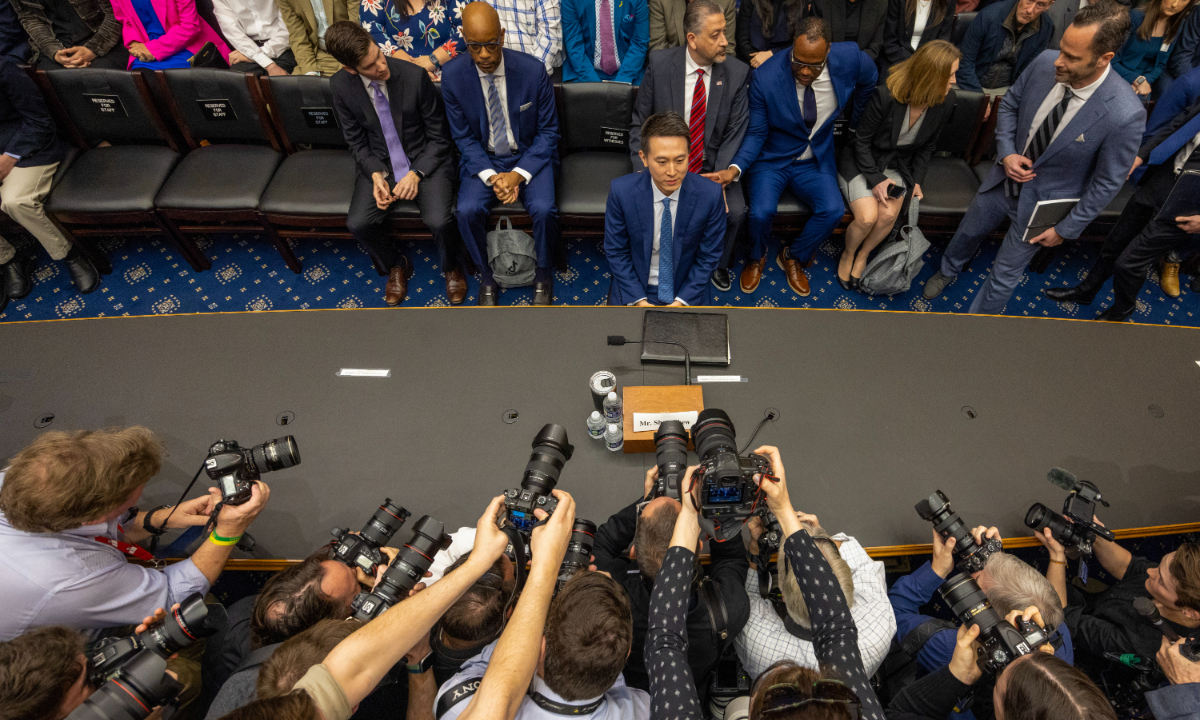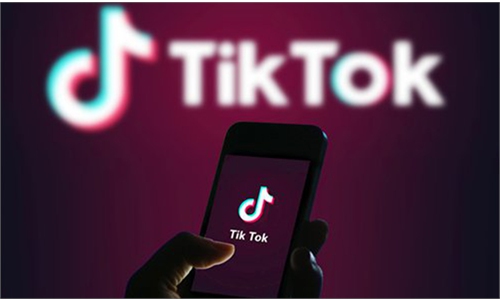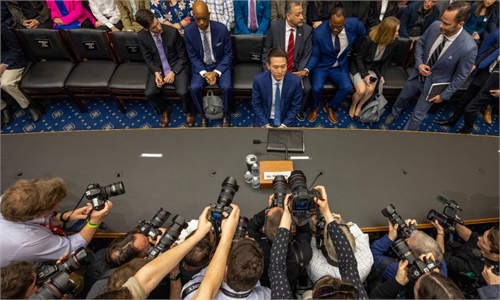
TikTok CEO Shou Zi Chew (center) testifies at a US Congressional hearing on March 23, 2023. The hearing, which was supposed to discuss data security and protection of children, was described by many netizens as a barbaric witch-hunt and pure bullying. Photo: VCG
US Congress hearing on TikTok earlier in March caught the attention of the media and the public in the US and abroad. Rather than "hearing" Shou Zi Chew, CEO of TikTok, US House Energy and Commerce Committee members literally rebuked him in a rather lopsided manner. One of the most widely circulated and ridiculed questions of this "public trial" was from a US lawmaker who asked him whether TikTok would have access to home Wi-Fi network. Chew was, at first, a bit puzzled by this somewhat "incomprehensible" question.
After this hearing, many US TikTok content creators now regard Chew as a hero fighting in the Congress for their fundamental rights to speak and communicate freely on TikTok, the No. 1 short video-sharing platform in the US market. If Meta, Google, or Amazon had created or somehow owned TikTok, everything would just be fine. However, TikTok happens to be a platform owned by a private corporation in China that happens to be the No.1 strategic competitor of the US. It is viewed as problematic by those lawmakers because of where it is from.
Quite interestingly, as to the various accusations made by the whole group of indignant US lawmakers against TikTok, like theft of personal data, misinformation for teenagers, and threat to US national security, many Americans who got these same lawmakers elected, however, do not buy it at all. They complained on social media networks that those committee members pointing fingers at TikTok in the hearing do not represent the 150 million monthly active US TikTok users.
This can be an unprecedented and defining moment of the internet age, especially in the context of drastically changing international relations, when American people are accusing US lawmakers of undermining the exercise of their constitutionally protected right to free speech in a social media platform that is owned by a Chinese private company.
Wouldn't it be the most realistic choice for US lawmakers to pass a specific data privacy protection law for social media platforms including TikTok? Of course, things are just not that simple. Does Cambridge Analytica ring a bell? They chose the most controversial but also the most convenient way - to ban it.
In a previous article published in August 2020, which used Donald Trump's attempt to ban TikTok as an example to show Washington's anxiety in "dusting off its anti-Communist playbook," I raised a question: How to brand US opposition with political purpose and thereby regain tech dominance and the lost market share?
Biden has replayed the Trump playbook but walked a firmer line and received unprecedented bipartisan support from Congress. In fact, they are very close to pointing it out: TikTok carries an "original sin" that it just can't get rid of. In the most innovative, influential, and profitable area of the internet, a platform brought by a Chinese company that beats all other ones including those developed by the US tech giants is utterly unacceptable.
So, the decision seems to have been made, "Let's shoot it down, and make it a shooting star, if we cannot own it."
It is not a shooting star, but a meteor shower. ZTE, Huawei, DJI, 360 Security, SMIC International, Hikvision, and the list goes very, very long and still counting.
Now we should all understand why there were moments when the committee members didn't give Mr. Chew much chance to answer the questions. It is because the "original sin" of TikTok that cannot be overturned under the premise of the inference of guilt.
In a larger context, banning TikTok is just a tiny part of a new fundamental, comprehensive, and persistent campaign against China by Washington, which can be put as a "pan-ideologization" of all economic and commercial activities, especially including technology innovation and digital creation. Over the years, the US has gone from being an engaging supporter who welcomed China's integration into the international community to an irascible fanatic who surrounds China at every turn.
What matters is how to abandon the "pride and prejudice" of guilty inferences so that both are more able to find room for maneuvering in handling bilateral relations with more political wisdom and diplomatic skills.
Then, why not put aside the inference of guilt against TikTok for a moment, and give a hearing to 150 million US TikTok users next?
The author is an associate professor at the Institute of International Studies of Gongdong Academy of Social Sciences. opinion@globaltimes.com.cn



